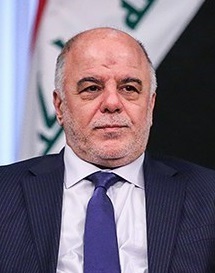 W
WHaider Jawad Kadhim al-Abadi is an Iraqi politician who was Prime Minister of Iraq from September 2014 until October 2018. Previously he served as Minister of Communication from 2003 to 2004, in the first government after Saddam Hussein was deposed.
 W
WSayyid Mahmoud Hashemi Shahroudi was an Iranian Twelver Shia cleric and conservative politician who was the Chairman of the Expediency Discernment Council from 14 August 2017 until his death on 24 December 2018. He was previously the Chief Justice of Iran from 1999 to 2009.
 W
WIbrahim Abd al-Karim al-Eshaiker, also known as Ibrahim al-Jaafari, is an Iraqi politician who was Prime Minister of Iraq in the Iraqi Transitional Government from 2005 to 2006, following the January 2005 election. He served as Minister of Foreign Affairs from 2014–2018.
 W
WNouri Kamil Muhammad-Hasan al-Maliki, also known as Jawad al-Maliki or Abu Esraa, is secretary-general of the Islamic Dawa Party and was the Prime Minister of Iraq from 2006 to 2014 and a Vice President of Iraq from 2016 to 2018. Al-Maliki began his political career as a Shia dissident under Saddam Hussein's regime in the late 1970s and rose to prominence after he fled a death sentence into exile for 24 years. During his time abroad, he became a senior leader of the Islamic Dawa Party, coordinated the activities of anti-Saddam guerrillas and built relationships with Iranian and Syrian officials whose help he sought in overthrowing Saddam. Al-Maliki worked closely with United States and coalition forces in Iraq following their departure by the end of 2011.
 W
WAbbas al-Moussawi Arabic: عباس الموسوي; 26 October 1952 – 16 February 1992) was an influential Lebanese Shia cleric, co-founder and Secretary General of Hezbollah. He was killed by the Israel Defense Forces in 1992.
 W
WHassan Nasrallah (Arabic: حسن نصر الله [ħasan nasˤrɑɫɫɑh]; born 31 August 1960) is a Lebanese cleric and political leader who serves as the 3rd secretary-general of Hezbollah since his predecessor, Abbas al-Musawi, was assassinated by the Israel Defense Forces in February 1992.
 W
WMuhammad Baqir al-Sadr, also known as al-Shahīd al-Khāmis, was an Iraqi Shia, philosopher, and the ideological founder of the Islamic Dawa Party, born in al-Kadhimiya, Iraq. He was father-in-law to Muqtada al-Sadr, a cousin of Muhammad Sadeq al-Sadr and Imam Musa as-Sadr. His father Haydar al-Sadr was a well-respected high-ranking Shi'a cleric. His lineage can be traced back to Muhammad through the seventh Shia Imam Musa al-Kazim. Muhammad Baqir al-Sadr was executed in 1980 by the regime of Saddam Hussein along with his sister, Amina Sadr bint al-Huda.
 W
WGrand Ayatollah Sayyid Muhammad Muhammad-Sadiq al-Sadr was a prominent Iraqi Shia marja'. He called for government reform and the release of detained Shia leaders. The growth of his popularity, often referred to as the followers of the Vocal Hawza, also put him in competition with other Shi'a leaders, including Mohammed Baqir al-Hakim who was exiled in Iran.
 W
WKasim Muhammad Taqi al-Sahlani was an Iraqi politician. He was a member of the National Assembly of Iraq and was the head of the parliamentary bloc of the Islamic Dawa Party - Iraq Organisation, the fifth largest party within the ruling United Iraqi Alliance coalition. Further, he was a member of the National Assembly's Foreign Affairs Committee.
 W
WEzzedine Salim,, also known as Abdelzahra Othman Mohammed, was an Iraqi politician, author, educator, Islamist theorist and one of the leading members of the Iraqi Dawaa Movement between 1980 and 2004. He served as the President of the Governing Council of Iraq in 2004.
 W
WMohammad-Ali Taskhiri was an Iranian cleric and diplomat. During the 1980s, Taskhiri served as the Iranian representative to the Organisation of the Islamic Conference and was involved in promoting Iranian interests during the height of the Iran–Iraq War.